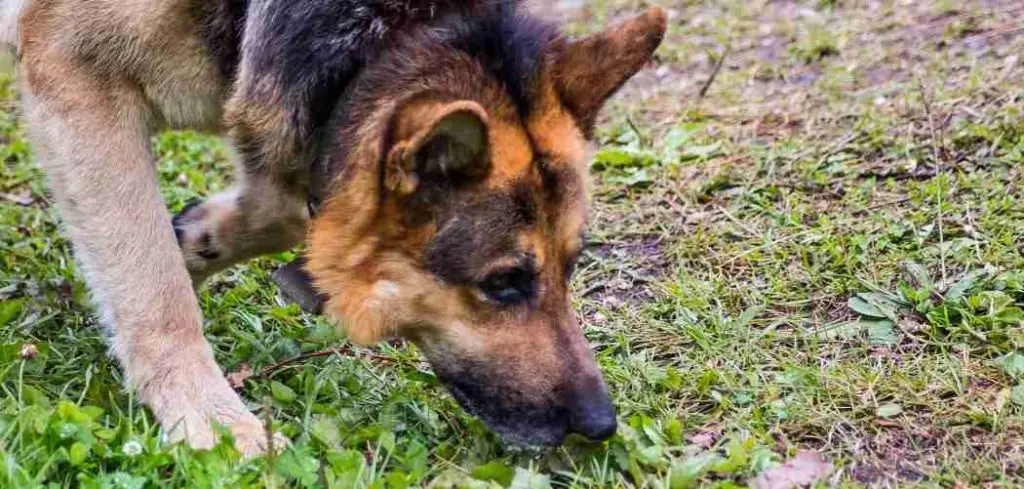
Do German Shepherds dig? In short, yes German Shepherds can dig and some dogs will do so frequently if they feel that it is in their best interests. But you can’t determine why they are digging until you head out there and learn more. Check the holes for hidden items, watch their body language as they dig and try and find the best solution.
In this guide, you will learn more about the issue of German Shepherds digging. We will discuss some of the behavioral traits that cause these dogs to dig. This means looking out for tell-tale signs that will indicate the reason for this behavior. From there, we can look at some of the actions that you can take to try and stop your German Shephard digging. These solutions could be the positive proactive solution that you need. Finally, we will look at some of the things to avoid when training GSDs not to dig.
Table of Contents
Do German Shepherds dig and why would they do so?
The simple answer here is that yes, your German Shephard could start digging in your yard. The reason for this will vary depending on the desires or stresses felt by the dog. Common reasons include a desire to create a secure den, the need for shelter in the yard, burying or retrieving items, boredom, separation anxiety, and a desire to reach other dogs. We will look at these in greater detail below. Once you determine the reason, you can work on creating a better environment for your dog at home where they don’t feel the need to make these “home improvements” themselves. This includes creating a den inside the home, giving them enough attention and the right diet, securing the perimeter of the property, and providing a designated digging area. It is important that whatever the problem and solution, you handle everything in a positive manner. Again, you can learn more about this below.
Blame the wolf ancestry rather than the thought process of the dog.
There is an instinct for dogs to dig that come from deep within their DNA. We may have domesticated dogs a long time ago but they still mimic many of the behaviors of their lupine ancestors. Wolves have a more basic set of needs than your pet dog: food, water, shelter, and the survival of the pack. Shelter means a secure den underground away from danger. So, it is common for dogs to crave this and exhibit their desire for a den by digging.
Uncover the specific behaviors to get to the root of the problem
The first thing that you need to do is figure out why your German Shepherd is digging. There can be several possible reasons and, if you want to discourage this behavior, it is important to determine that route cause. Consider these three factors first.
~Where are they digging?
~What are their mood and behavior like when they are digging?
~Are any items, such as food or toys, involved in this digging behavior?
If there are items of food, toys, or other possessions involved then you need to look at why they feel the need to secure them underground. If they seem agitated when digging then it might due to some form of distress. Happier dogs might just be having fun. Do they dig when you are around or do you come home to new holes outside? Are those holes in the middle of the lawn, in shaded flower beds or over by the fence?
Is your German Shepherd digging to build a secure den outside?
One common reason for digging comes from that instinct to create a safe den outside. Some female dogs will do this because it is within their DNA to want a safe home for their pups – even if they aren’t pregnant.
Others will crave this den because they don’t have a similar space to get comfortable in the home. This is also why you will find some German Shepherds lying under furniture. They like the security of the enclosed space and you might also notice them taking their toys and blankets under there.
Is your German Shepherd digging to keep warm or cool outside?
Many animals will dig holes and scrapes in the ground to help them regulate their temperature. It could prove to be a nice cozy spot away from the chill of the wind. Or, the depression could cool them down in the heat of the sun. if your dog starts digging, lies down, and begins to pant then you have a deeper issue with their comfort outside.
Is your German Shepherd digging to hide treasured possessions?
Some dogs like to bury their toys and other treasured items in the yard to keep them safe. While a lot of this comes from those canine instincts again, you have to question why they don’t feel safe keeping their toys in the home? Who are they protecting them from?
Is your German Shepherd digging to hide food?
There is another type of item that you might discover in these holes, and that is food. Some dogs will take items of food, such as bones and pieces of hiding, and bury them in holes in the yard. When you catch them digging they might be burying or retrieving it.
Here you need to question why they feel the need to put their food in a safer place. What are they afraid of? Do they worry about others stealing it or that they need to be precious with their food and hoard for an emergency?
If it is the former, you might have to take a closer look at the feeding habits of your pets and the actions ofyour other dog. If it is the latter, your dog might feel as though they aren’t getting enough food.
Is your German Shepherd digging out of boredom?
This can be a difficult question to ask as a pet owner, but do you German Shephard have anything better to do? If digging is their best outlet for their energy and personal amusement, there is a clear issue here.
Dogs should have enough toys and other resources to keep them happy and keep their brains active – especially smart breeds like the GSD.
Is your German Shepherd digging because they don't get enough attention?
German Shepherds are family-oriented dogs and will enjoy the company of their pack. So, if they don’t get enough of that attention, they might start acting out. Bad behavior is one way to get you to pay attention to them.
This might not manifest through digging, it could be other destructive behavior. But, if you have a dog that enjoys digging, there is a good chance that they will use this an outlet for their frustration.
Is your German Shepherd digging to reach other dogs?
Finally, if you find that your dog has a
habit of digging around the fences, it could mean that they are trying to get
to other dogs. If male German Shepherds can smell a female, it could tempt them
to find a way out to get closer to her. This is even more likely if the dog is
in heat. But, any bored dog that can hear or smell possible friendly playmates
might decide to make that break for freedom.
Sometimes your dog digging can be put to good use
What are the solutions to your German Shepherd digging in your yard?
What can you do as a dog owner to ensure that your dog no longer feels the need to carry out these behaviors? The solutions will depend on the severity of the issue, the damage to your property, and whether you want to decrease the issue or stop it altogether.
This is an interesting point to consider here. How important is it to stop your dog digging altogether? If your dog enjoys digging and there doesn’t seem to be any major issue going on, it might seem harsh to stop them completely. But, you also don’t want them going out and messing up the lawn or digging up prized flowers. This is especially true if you are part of a homeowners association with strict rules to follow. You can either work hard to stop them from digging at all through the options below. Or, you could train them to dig in a designated area in the garden. A sandbox is ideal if you have the space within your yard and the money to build one. This contains all the digging, den creation, and burying without spoiling the rest of the property. Your dog can release pent up energy and have fun and you can keep the neighbors happy.
However, if this isn’t practical or you feel that there are deeper issues to resolve behind the digging, you need to look deeper into these behavioral traits and possible solutions. Once you figure out the cause from the list above, it is up to you to find the appropriate fix. Keep in mind that your new solution might not work overnight. You may still need to train your dog not to dig and convince them that they no longer need to. But, patient effort should be rewarded. Here are some options to consider.
What to do if your German Shepherd is digging to build a secure den outside.
If the main issue here is the desire to get away and create a form of den, help them out by creating one inside the house. Give your dog a safe space where they can feel secure and get a little peace and quiet as needed. This could be essential in homes with lots of kids where your dog rarely gets a moment to themselves.
Get a crate that is just the right size, cover it with blankets to make it nice and dark, and let your pet create a room of their own. Try and stop other family members or pets from going in and interfering with it too.
What to do if your German Shepherd is digging to keep warm or cool outside.
Dogs that are creating depressions and holes for comfort outside need better options. Look at the shelter provided for your pets when they are outside. Can they get away from the wind or the heat of the sun? Or is the yard too exposed, especially in the hottest months?
The answer might lie in a dog house. An outside house, with the right protections and dimensions, provides a great alternative to a hole in the ground. They don’t have to cost too much and can look quite attractive.
What to do if your German Shepherd is digging to hide treasured possessions.
The option of creating a den within the home could help here too. Your dog might try to hide their beloved toys because they don’t think that there is anywhere safe in the home.
A personal den gives them that security and could discourage them from digging. Alternatively, you might just need to keep on eye on your kids and other pets to see if they keep taking the toys away.
What to do if your German Shepherd is digging to hide food.
If your dog is insecure about eating their food, try and give them a safe space in which to eat. Give them some space with the same bowl and comfortable surroundings.
Again, don’t let other animals or kids interfere so that your GSD can feel less anxious. Also, consider the portion sizes to make sure that they are getting enough and don’t feel the need to hoard any scraps.
What to do if your German Shepherd is digging out of boredom.
Dogs that are bored need plenty of enrichment, especially while you are away at work or if the kids are at school. This means providing the right toys to keep them occupied. German Shepherds are smart and will appreciate puzzles such as food puzzles.
Also, don’t forget to give them plenty of exercise to deal with any pent up energy. If they aren’t getting long enough walks then they might continue to dig. Play with them in the yard instead of leaving them out there alone.
What to do if your German Shepherd is digging because they don't get enough attention.
The solutions here are very similar in that you need to find ways to occupy your dog and combat social anxiety. Reassure them that you won’t be gone long. Work on bonding with them through playtime when you are home so they get the love and attention they crave.
Also, where possible, consider having family and dog-sitters come by to check in on them during the day.
What to do if your German Shepherd is digging to reach other dogs
Those that are digging to reach other animals on the other side of the fence will stop without that stimulus. But, it is easier said than done to keep other dogs away from the immediate vicinity of your yard.
One option is to make sure to neuter your pet. This could lower that drive to get out and get with the female. Another option is to reinforce the boundary so they can’t get out. Grow shrubs around the edge or put stones under the soil so there isn’t easy access to the other side.
Training tips to stop your German Shepherd from Digging
Always take a positive approach when training your German Shepherd out of this behavior.
Even if you feel that you do need a quick fix and get frustrated when your dog continues to dig, negative reinforcement is not the answer. You undoubtedly know from personal experience how hard it is to break a habit, especially one that brings comfort in times of stress.
It is so much better to get positive feedback and praise for making a step in the right direction then being scolded or punished for slipping up. Tell your dog they are doing something wrong and walk away to avoid giving them unnecessary attention. Then, when they stop and come over to you, praise them for their choice.
Avoid negative reinforcement
There are lots of examples of negative reinforcement. Correction collars are something that dog owners will always argue over. These devices can emit a static charge or an unpleasant sound when dogs do something wrong. The idea is that the dog associates the unpleasant experience with the bad behavior. But, this can be a bit drastic when there are so many other actions you can take to help.
One of the most important things to remember here is that this isn't your dog's fault.
German Shephard digging behaviors are partly down to instincts within them from their wolf ancestors and partly because of the environment in which they live. It is up to you as a responsible owner to get to the bottom of the problem, uncover any anxieties or issues, and then work to fix them.
Don’t punish the dog for using survival instincts when it feels stressed or uncomfortable. Work with them to improve their situation and reward them for changing their behavior when it is safe and comfortable for them to do so.
To read some more on German Shepherd behaviour checkout our Behaviour Section
Hopefully this article has helped answer the question “Do German Shepherds Dig?” and has provided you with some useful advice on how to potentially stop this unwanted behaviour from happening. Does your German Shepherd Dig? What did you do to stop them? We’d love to hear from you in the comments.

